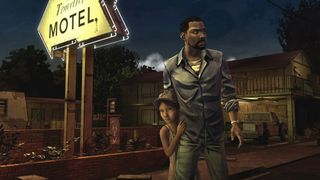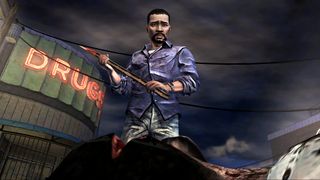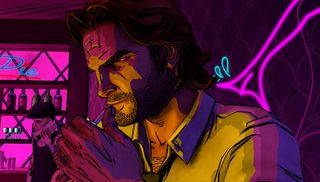Telltale's choices aren't about plot, but something more significant

This article contains spoilers for The Walking Dead and Wolf Among Us, which you really should play if you haven’t already. You might want to skip the second-last footnote if you haven’t played Spec Ops: The Line too.
Telltale’s games each begin with a warning: “This game series adapts to the choices you make. The story is tailored by how you play.” That sets up an expectation plenty of players have been disappointed by—an expectation they’ll be able to radically alter the plot, twisting it into something like one of those pictures of a cobweb made by a spider on caffeine. In reality, Telltale’s The Walking Dead, The Wolf Among Us, and more recently Game Of Thrones and Tales From The Borderlands1 funnel players back to a baseline every couple of episodes. Then they branch, and then they funnel again. It’s not The Stanley Parable Adventure Line, but it’s a close relative.
There’s a moment in the third episode of The Walking Dead when the character you chose to save in the first episode—either Carley or Doug, though for the 75% of us who prefer competent gun-wielding survivors it was Carley—gets unceremoniously killed off. In the moment, it was shocking. Later, when I realized it happens no matter who you save and the decision was at least partially motivated by the cost of writing and recording different dialogue for future episodes (the character in question plays a noticeably reduced role in episode two for the same reason), I felt like I’d seen behind the curtain. Some of the impact was reduced.

The choices you make in Telltale games have limited consequences for the plot, it’s true. But they have massive consequences for the characterization and theme, which is something few other games offer. There’s more to stories than plot, after all.
The comic book The Walking Dead is based on is overt about its theme. At the end of issue 24 Rick Grimes delivers a speech making it very plain, saying “we already are savages” and then, shouting over a two-page spread, “WE ARE THE WALKING DEAD.” It’s classic Man Is The Real Monster stuff, fitting for a grim series where survivors betray each other constantly. Telltale’s game gives you the option of choosing a different interpretation. Lee doesn’t have to become hardened by being forced to make hard decisions; he can maintain his belief in human nature and then pass that on to Clem. He dies no matter what, but whether he dies with words of warning or compassion on his lips–whether this is a story about hope or fear—is up to you.
Like a lot of zombie fiction the comic takes a cynical view of humanity, suggesting civilization is a thin veneer and we’ll fall into savagery as soon as catastrophe strips it away. That’s not what happens after disasters in the real world, however. After Hurricane Sandy hit New York, the Gothamist reported that crime rates dropped by 31%. We expect the opposite, sometimes with dangerous consequences. Reports of looting and violence in New Orleans following Hurricane Katrina were exaggerated by politicians and the media to such an extent that a bipartisan committee later wrote, “The hyped media coverage of violence and lawlessness, legitimized by New Orleans authorities, served to delay relief efforts by scaring away truck and bus drivers, increasing the anxiety of those in shelters, and generally increasing the resources needed for security.”2
Maybe a plague of actual zombies would be enough to turn us into lawless beasts, and if you believe that Telltale will let you tell that story. When the survivors decide to steal from the car at the end of episode two you’re welcome to join in. But you can also tell a different story, one about a man who refuses to steal because he wants to set a better example for a child. The endpoint of both those stories is the same if you reduce them to their barest plot points, sure, but why would you?
The biggest gaming news, reviews and hardware deals
Keep up to date with the most important stories and the best deals, as picked by the PC Gamer team.

Similarly, The Wolf Among Us lets you subvert Fables, the comic it’s based on. Bigby Wolf is feared because he was once the Big Bad Wolf of legend, but it’s on you whether he lives up to that reputation or not. After a bar fight with Grendel you have the option to tear his arm off, Beowulf-style, to ensure he doesn’t try it again, or you can simply walk away. The comics often portrayed Bigby as ruthless and apparently Bill Willingham, the writer of Fables, removed Gren’s arm when he played the game3. But The Wolf Among Us doesn’t have to be another hardened hard man story. Your Bigby doesn’t have to be the monster everyone thinks he is, and can take actions that would never happen in the comic it’s based on.
Big Choices have become part of the shared toolkit of modern video games—take, for example, retro RPG Wasteland 2. Early on you’re forced to decide between saving a settlement or a laboratory, with the obvious implication that the other will be destroyed before you can get to it. The repercussions seem large–different areas to explore, different characters to talk to, different missions to complete–but while the meat-and-potatoes of the game changes, the theme remains the same either way.
You’ll be berated for letting one place be destroyed no matter which you save, but you’ll never be asked why you made the choice. Maybe you saved the settlement because there were children there, maybe you saved the lab because trained scientists are more valuable than ordinary folk, maybe your decision was informed by the fact that one provides food and the other water. It doesn’t matter. Wasteland 2 doesn’t care why bad things happen, it just knows they need to because that’s how post-apocalyptic fiction works4.
Forcing us to focus on why we make characters do things brings us closer to them.
Letting players pick their own morals is something Telltale’s games have in common with Edgar Allan Poe’s stories. The author of ‘The Tell-Tale Heart’ disliked the idea of writers forcing a single reading of their work, or bending all their stories to an overarching morality. While the murderer who narrates ‘The Tell-Tale Heart’ is wracked with guilt and eventually confesses, the murderer who narrates ‘The Cask Of Amontillado’ feels no guilt and suffers no consequence. Poe thought it was better for writers to focus on creating “effect” (if he was writing today he’d probably have said “feels”), and that’s what Telltale’s games achieve 5. Forcing us to focus on why we make characters do things brings us closer to them. It’s why the endings of both seasons of The Walking Dead are such tearjerkers, and why we share Bigby’s shock at the end of The Wolf Among Us.
The choices in Telltale games aren’t just meaningful because they foster this connection with the characters, however. By giving players control not over the plot but over the context that plot happens in, the choices become meaningful in the most literal sense—they let you alter the meaning of the story. That’s a rare thing in video games, and worth recognizing.
1 I’m focusing on The Wolf Among Us and the two seasons of The Walking Dead in this article because those are complete at the time of writing, though Game Of Thrones seems to be following the formula so far. Three episodes in, Tales From The Borderlands feels like the odd one out given how light-hearted it is. If its final episodes are as good as the first three it might just be Telltale’s masterpiece, though.
2Sociologists have tried to debunk the myth that theft follows disasters, which they call “elite panic”, but it’s a pervasive part of our culture. Even a game like This War Of Mine, which is based loosely on the 1992–1996 siege of Sarajevo, falls prey to it. In This War Of Mine you have to keep guard at night to keep out raiders because your neighbors are as much of a threat as the snipers and bombs. Its initial inspiration was One Year In Hell, the account of a survivor of Sarajevo’s siege known only as Selco, who wrote that, “In these situations, it all changes. Men become monsters.” But accounts from other survivors differ from Selco’s, depicting communities coming together, sharing rather than stealing. Selco is the one who got famous, however, and now sells his expertise through online courses for survivalists.
3That info comes from an interview with the writers of The Wolf Among Us comic (yes, there’s a comic based on the game that’s based on a comic). The series is still ongoing, but so far it’s been weird seeing which Bigby is the Official Canon Bigby. As well as ripping Gren’s arm off he burns down Aunty Greenleaf’s tree. I like my Bigby better.
4To pick another example of a game that does things closer to the Telltale way, Spec Ops: The Line forces you to commit an atrocity but allows you to choose how the protagonist feels when confronted by his crime at the game’s conclusion. It was just as divisive–there’s no way to keep playing without killing innocent people–but like Telltale’s games it lets you determine how the main character feels and whether he’s capable of being redeemed or not. It makes for a powerful ending that’s like nothing else in modern military shooters.
5Closer to the hardboiled crime genre The Wolf Among Us was inspired by, Raymond Chandler had similar ideas. Mystery stories are famously dependent on tight plotting, but while writing to one of his editors Chandler explained why he believed his audience cared less about that than was usually assumed: “My theory was they just thought they cared nothing about anything but the action; that really, although they didn’t know it, they cared very little about the action. The things they really cared about, and that I cared about, were the creation of emotion through dialogue and description...” Read that back, “the creation of emotion through dialogue and description” is such a perfect summary of what Telltale do it should be on their business cards.

Jody's first computer was a Commodore 64, so he remembers having to use a code wheel to play Pool of Radiance. A former music journalist who interviewed everyone from Giorgio Moroder to Trent Reznor, Jody also co-hosted Australia's first radio show about videogames, Zed Games. He's written for Rock Paper Shotgun, The Big Issue, GamesRadar, Zam, Glixel, Five Out of Ten Magazine, and Playboy.com, whose cheques with the bunny logo made for fun conversations at the bank. Jody's first article for PC Gamer was about the audio of Alien Isolation, published in 2015, and since then he's written about why Silent Hill belongs on PC, why Recettear: An Item Shop's Tale is the best fantasy shopkeeper tycoon game, and how weird Lost Ark can get. Jody edited PC Gamer Indie from 2017 to 2018, and he eventually lived up to his promise to play every Warhammer videogame.
Most Popular


